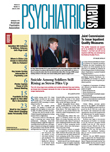Personality—an enduring set of traits influencing a person's thoughts, feelings, and behavior—can influence how long people live, a new study suggests.
The study was headed by Hajime Iwasa, Ph.D., a researcher at the Tokyo Metropolitan Institute of Gerontology in Japan. Results appeared in the May American Journal of Geriatric Psychiatry.
Iwasa and his colleagues administered the NEO five-factor inventory, Japanese version, to 1,228 adults aged 65 or older living in Japan. This inventory, which is among the most widely used yardsticks to measure personality traits in health science, assesses the “big five” personality traits of neuroticism, extraversion, openness, agreeableness, and conscientiousness.
Neuroticism denotes a tendency to be vulnerable to psychological distress. Extraversion indicates a tendency to be sociable and active and experience positive emotions. Openness encompasses intellectual curiosity, imaginativeness, and a preference for varied experiences. Agreeableness refers to being trusting, sympathetic, and cooperative. Conscientiousness consists of a disposition to be organized, diligent, and achievement oriented.
The researchers followed their subjects during the next five years and found that 127 had died. They then looked to see whether there were any links between the personality traits evaluated and subsequent death.
Individuals who died were more likely to have scored lower on conscientiousness, extraversion, and openness than were individuals who were still living. These differences were highly significant statistically. However, neither neuroticism nor agreeableness was related to mortality. And after possibly confounding factors such as age, gender, number of years of education, living alone, presence of psychiatric problems, or presence of chronic medical problems were considered, conscientiousness, extraversion, and openness—but not neuroticism and agreeableness—were still significantly associated with mortality. The strongest link was between conscientiousness and longevity.
That conscientiousness seems to promote longevity is not surprising, Iwasa and his colleagues wrote. People with this trait tend to practice a number of healthy behaviors such as not smoking, drinking in moderation, exercising regularly, and adhering to medical recommendations.
Also, that extraversion seems to promote longevity is to be expected, they continued, because extraverted individuals are prone to engage in social interactions, which in turn are known to decrease the impact of stress on health.
As for openness and longevity, they had not anticipated finding any link, they said. But the fact that they did was not altogether surprising, they observed, since openness, which indicates intellectual curiosity and a preference for various experiences, might help a person adapt to the numerous challenges of old age such as illness, disability, and bereavement. Besides, Iwasa and his coworkers recently explored personality traits among Japanese centenarians and found that many scored high on the personality trait of openness, they noted.
But what really surprised them, they admitted, was that they found no link between neuroticism and mortality. They had expected that being neurotic would make people more vulnerable to death since people with a high degree of neuroticism are prone to negative emotions such as anxiety, depression, and anger, which in turn are known to increase the risk of death.
“This trait,” the researchers suggested, “may have a protective role against mortality because greater neuroticism motivates individuals to consult doctors, [and thus] these conflicting effects might become mixed together and. .explain why no relationship between neuroticism and mortality was found in this study.”
Finally, as for finding no link between agreeableness and mortality, it too surprised them, they wrote, since people who are highly agreeable tend to be warm and sympathetic to others and to obtain social support when stressed.
Iwasa and his colleagues will next attempt to learn more about the personality trait–mortality links that they have found, he told Psychiatric News. For example, only about a third of older Japanese bother to have annual physical checkups. Could the reason be that the other two-thirds aren't very conscientious?
The study was funded by the Japan Society for the Promotion of Science.
